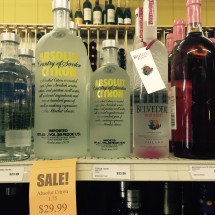The Law Offices of John P. Connell, P.C.: In July 2014, the Massachusetts Alcoholic Beverages Control Commission (“ABCC”) ruled on a false advertising case whereby Wegmans, a grocery chain with a Section 15 package store license located in Newton, Massachusetts, was investigated by the ABCC for violating 204 CMR 2.03 (2), the Massachusetts law prohibiting false, misleading, and deceptive advertising in the alcoholic beverages industry. The advertisements in question were in-store signs that compared the chain’s prices to those of a nearby liquor store licensee. Each sign listed Wegmans as having the lower price for a specific wine or beer product. The chain, through its attorney, stated that there “may have been some confusion on the prices” because the information was purchased from an outside company that checks all retailer prices. The nearby liquor store licensee, whose prices were compared in the advertisement, complained to the ABCC that the comparisons incorrectly stated his prices. In support of his complaint, the competitor provided the ABCC with photographs of the in-store signage, his sales receipts and internal records. For two of the five products specifically cited in the ABCC decision, the complaining licensee charged less than Wegmans even though the ads stated otherwise. One product advertised had not been carried by the competitor for over six months and its price at that time was the same as the chain’s price. Two of the products cited were priced slightly higher at the competitor’s establishment than at Wegmans, but the competitor’s pricing was advertised as being higher than it was in reality.
During the investigation, Wegmans stated that its signage was now “correct because store personnel was buying the products and obtaining the receipts.” The ABCC, however, issued Wegmans a “warning” not because it found the advertisement was in fact “false” but because it was not abundantly clear that the competitor’s prices were accurately described. The ABCC held that “Any advertising matter which directly, or by ambiguity or omission tends to deceive or to create a misleading impression shall be deemed to be false and untrue.” Licensees should therefore be careful when advertising their competitor’s prices, as those competitors have a strong motive to return the favor by calling in to the regulators any “untrue” or even “ambiguous” claims made in an advertisement.
Submitted by Gregory Birney

